Dancing the Khorumi on Rustaveli Avenue
How a dance meant to celebrate Georgian life has been turned into a ballet of national doom
Khorumi, Elene Kintsurashvili, a program analyst with the German Marshall Fund (GMF), wrote in a post where she commented on a video of Georgian youth dancing in a park near Rustaveli Avenue, the main street of the Georgian capital of Tbilisi, “is an absolute masterpiece. Since Georgia has seen many wars throughout its history, Khorumi is a call from the past. It serves as a reminder that in order have peace, we must be ready for war.”
Just a quick factcheck for Elene—the last time Georgia went to war, in 2008, it didn’t turn out so well. Possessing a US-trained and -equipped force of several brigades, including dozens of tanks and artillery pieces backed by a robust air force, the Georgian army forcibly entered the breakaway territory of South Ossetia, after then-Georgian President Mikhail Saakashvili followed the advice of then-Secretary of State Condoleezza Rice to be more “decisive.” The Georgian forces attacked Russian peacekeepers, who had been operating on the soil of South Ossetia since 1993, killing two and wounding five others. The Russian army responded, routing the invading Georgian force in four days. Some 180 Georgian soldiers and security forces were killed, along with 224 civilians. Hundreds of others were wounded.
No one danced the Khorumi then.
The GMF is an ostensibly non-partisan American public policy think tank that claims to promote “cooperation and understanding between North America and the European Union.” But lately it seems to be favoring confrontation and conflict over dialogue and peace. This point was driven home at the recently convened Brussels Forum (a GMF-sponsored event). There, Laura Thornton, who oversees the GMF Alliance for Securing Democracy (ASD), through which GMF “tracks and analyzes malign internal and external influence operations that target democracies worldwide and builds strategies to thwart them,” declared that, “The time for democracy to go on the offensive has long passed. This is going to require democracies to ally, the way autocracies do. This is going to require disruption and risk taking.”
The streets of Tbilisi have been transformed into the literal manifestation of GMF-inspired “disruption and risk taking.” The Georgian youth dance the Khorumi in between bouts of massive protest that have become increasingly violent since they began early last month, when Georgian political opposition parties, together with western non-governmental organizations (NGOs) and the Georgian social movement organizations (SMOs) they sponsor took to the streets in opposition to the so-called “foreign agents law,” which would require these NGO’s and SMO’s to declare the sources of foreign funds that amount to 20% or more of their budgets.
Since these NGO’s and SMO’s are almost exclusively the byproduct of the policies and monies of organizations like the German Marshall Fund, the impact of this law would be that the Georgian public would become aware of who is underwriting the programs that are being fronted by Georgian NGO’s and SMO’s and, perhaps more disturbing to the GMF and similar organizations, what the real policy is behind this money.
Thornton served for more than 20 years in leadership positions overseas at the National Democratic Institute (NDI), which is the Democratic Party’s operational arm of the National Endowment for Democracy (NED), created during the administration of President Ronald Reagan to provide an overt bureaucracy to manage what had previously been covert political action operations organized and implemented by the Central Intelligence Agency. In short, the NDI, together with its Republican Party twin, the International Republican Institute (IRI), carry out soft-power regime change operations under the guise of “building democracy.”
Let there be no doubt: what the GMF, NED and other organizations of their ilk are doing in Georgia today is a regime-change operation designed to topple the ruling Georgia Dream Party. It is a frontal assault on Georgian sovereignty, an insult to all Georgians, and a flagrant betrayal of the very principles of self-determination that underpin the global community in the era of the United Nations.
Georgia Dream has been in power since 2012, when it unseated former Georgian President Mikhail Saakashvili’s United National Movement Party, and is seeking a fourth term in office. From the very outset, Georgia Dream made it clear that it was pursuing a policy in which Georgia would seek membership in both NATO and the European Union (EU) while maintaining good relations with Russia, its neighbor to the north.
So far, so good.
The problem, however, is that Geargia Dream had “made in Georgia” stamped on it. For the policy makers in Washington, DC and Brussels, whose mission it was to ensure global submission to and compliance with the so-called “rules based international order” crafted by the United States in the post-Second World War era to impose and sustain American hegemony over the world, “Made in Georgia” was a threat. It implied actual sovereignty, up to and including a desire to live in peace with Georgia’s larger neighbor to the north, Russia. At a time when the United States was using the possibility of NATO and EU membership as bait to lure nations into the all-encompassing gravitational pull of the American Empire, such independence-minded thinking on the part of a potential partner was fatal to the cause and had to be eliminated.

The methodology of Georgia Dream’s execution was a coup disguised as “democracy.” Over the course of the past few decades, Georgia was the recipient of massive amounts of western financial assistance, much of it in the form of grants provided by western NGO’s passed on to Georgian SMO’s. These SMOs were ostensibly created to assist Georgia in building the foundations of “democracy,” which in this case meant meeting European Union (EU) societal norms and standards as a way of facilitating Georgia’s accession into the EU.
However, from the earliest days of the work of the SMOs, there was a clash between the progressive, diversity-inclusive agenda of the SMOs, and traditional conservative Georgian society which served as the political foundation of the Georgia Dream Party. Traditional Georgian values, it seemed, were not as welcoming to the “diversity inclusive” agenda promoted by the EU—in short, many Georgians objected to the mainstreaming of LGTBQ agendas into the Georgian political spectrum.
But there was an even bigger agenda at play. The founder of Geargia Dream was Bidzina Ivanishvili, a Georgian billionaire who made his fortune in Russian metals and banking during the wild, wild west days of the 1990’s. Because of his Russian business connections, many in the West viewed Ivanishvili’s intervention in Georgian politics as being an extension of Russian national security policy, something Ivanishvili and his supporters deny. The truth, however, does not matter in a world governed by perceptions. Perceptions can be easily managed, something the Laura Thornton’s of the world know only too well. It became the official policy of the United States and the EU to remove Bidzina Ivanishvili and Georgia Dream from power by carrying out a “soft power” coup orchestrated by western-funded NGOs and SMOs.
The methodology employed was simple—to flood the Georgian social and political spectrum with money, buying grass-roots support amongst a Georgian youth who were lured away from traditional Georgian values by the promise of western wealth and power. The youth of Georgia was literally recruited by the GMF and NED and others for the purpose of undermining the political viability of the Georgia Dream Party and its sponsor, Bidzina Ivanishvili. Professional propogandists like Thornton and Elene Kintsurashvili began painting Georgia Dream and Ivanishvili in Russian colors, proclaiming any policy initiative which promulgated the idea of Georgian sovereignty as nothing more than Russian propaganda. In short, any Georgian initiative which did not completely conform to the edicts of Washington, DC and Brussels was attacked as being nothing more than an extension of Russian imperial design. The concept of a free and independent Georgia was quashed by western elites whose vision of Georgia was limited to a vassal state operating in support of a larger western policy of containing and subverting Russia. NATO and EU membership was never a realistic proposition. Georgia was simply a tool to be used until broken, after which it would be discarded.
The Georgians who had become addicted to the opiate of western financial largesse, however, were blind to this reality. They allowed Georgia to be turned into a caricature of its real self, a nation defined by a flag which was never allowed to fly alone, but always alongside (or underneath) that of the European Union. The Georgian flag stopped being a symbol of a free and independent nation, and instead became a clothing accessory, something to be draped around the shoulder, like a scarf or cape.
Something to be cast upon the ground, like a carpet, so that ignorant Georgian youth could debase their culture by dancing the Khorumi around its edges, their feet kicking up dirt and dust that covered the once brilliant white and red colors of their national symbol, dulling them to a dirty grey.
Georgia Dream was cognizant of these western designs. While enjoying a comfortable parliamentary majority, the leadership of the Georgia Dream Party understood that this majority could collapse in the face of a concerted effort by the West and its paid Georgian minions to undermine the credibility of the Georgia Dream Party in the lead up to Parliamentary elections scheduled for October 26, 2024.
The situation for Georgia and the Georgian Dream Party became dire following the February 2022 decision by the Russian government to initiate what it called a Special Military Operation (SMO) against Ukraine. Like Georgia, Ukraine had been extended an invitation to join NATO in 2008. Like Georgia, Ukraine had been lured away from the Russian orbit by a promise of EU membership. The West finally got what it wanted with Ukraine—an actual shooting war with Russia where NATO could buffer itself using a non-NATO proxy. In short, NATO could weaken Russia economically and militarily without directly assuming the risks normally associated with war. Ukraine would do the dying. All NATO had to do was supply Ukraine with weapons and money.
As a prospective NATO and EU member, Georgia was expected to fall fully in line with the strategic goals and objectives of its western masters. But the Georgia Dream Party, ever cognizant of the need to serve the needs of the Georgian people first and foremost, balked at joining in with the sanctioning of the Russian economy. This decision turned out to be extremely beneficial to the Georgian economy and, by extension, the Georgian people—at a time when the economy of Europe was contracting because of the blowback brought on by the sanctions imposed on Russia, the Georgian economy enjoyed two consecutive years of 10% growth.
As the US/NATO/EU master plan for the strategic defeat of Russia faltered on both the global economic stage and on the battlefields of Ukraine, Georgia was placed under increasing pressure to join in on both fronts, sanctioning Russia while opening up a second front against Russia in order to divert Russian military resources away from the Ukraine front. The Georgia Dream Party resisted both, desiring instead to maintain continued economic growth while avoiding a suicidal conflict with Russia that could only end in the physical ruination of the Georgian nation.
For the Georgia Dream Party, it was more beneficial for the Georgian youth to be dancing the Kartuli, the symbol of Georgian romance and marriage, than the Khorumi.
To save Georgia from becoming a wasteland like Ukraine, Georgia Dream sought to level the political playing field inside Georgia by requiring organizations which are deemed to be pursuing the interests of a foreign power to register as such for the purpose of providing full transparency as to the motives and loyalties of such to the Georgian people. For the purposes of setting the bar regarding what constituted “pursuing the interests of a foreign power,” the law being pushed by Georgia Dream set as the benchmark the standard of 20% of the total income received by a given organization over the course of a calendar year as being derived from foreign sources. The proposed law did not in any way restrict the activities of any organization so designated—the purpose of the law was to provide full transparency for the Georgian people so they could be cognizant of the fact that issues and programs being pursued by so-called “Georgian” NGO’s and SMO’s were in reality reflective of foreign designs that may not coincide with the policies of the Georgian government.
As soon as the Georgia Dream put this new law on the floor of the parliament, the western-funded political opposition parties, backed by their western-funded NGO’s and SMO’s, took to the streets of Tbilisi in protest. At the same time, Georgian mercenaries fighting in Ukraine under the banner of the so-called “Georgian Legion” began preparations to return to Georgia, threatening to add a military dimension to the protests that could lead to civil war and the violent overthrow of the Georgian Government. Georgia Dream, faced with a crisis that it had not anticipated, withdrew the transparency law from consideration.
This retreat in the face of adversity may have saved the Republic of Georgia from catastrophe, but it was seen as a sign of weakness by the Georgian political opposition and their western paymasters. As a result, even more money began flowing into Georgia for the purpose of accelerating the transformation of Georgian civil society, the end goal of which would be to empower the Georgian opposition to prevail in the October 2024 elections. Once Georgia Dream was removed from power, a new Georgian government would immediately join in on the sanctioning of Russia. More ominously, the Georgian borders would be opened to the Georgian Legion and other western-backed mercenaries, who would join with the Georgian military to open a second front against Russia by attacking the breakaway republics of Abkhazia and South Ossetia.
Faced with this threat, the Georgia Dream Party had no choice but to reintroduce the legislation on transparency on foreign influence. This time, however, Georgia Dream understood the scope and scale of the opposition it would face. Like any good ruling party, it counted the votes before it introduced the legislation, ensuring that it had enough votes not only to pass the bill, but also override any potential veto by the Geogian Prsident, Salome Zourobichvili, a former French diplomat who had joined firmly with the goals and objectives of the Georgian political opposition and their US and European masters.
The problem presented by President Zourobichvili was not a minor one. She served as the commander in chief of the Georgian armed forces, which over the past quarter century had been trained and equipped by the United States and NATO. On April 30, she addressed the Georgian army on its 33rd anniversary. “I address you today because dark forces are at work, attempting to subjugate a country that could not be brought to its knees by fueling ethnic conflicts, igniting confrontation between brothers, or through direct war and occupation,” the Georgian President intoned. “Today, once again, they seek to divide society.”
For over 30 years, this country and its society have been united around one goal.
The European perspective is the only path to our independence, sovereignty, identity, diversity, tolerance, peace, and development.
Over these 33 years, there have been many crises, passions, and various political movements, but no one has ever questioned this sole goal.
The Georgian Army knows best who the enemy is and who is not – who tried to destroy us and who helped us shape modern defense forces. The Georgian Army knows why we participated in international missions and what contribution we made to global security.
Today, some want to portray our 30-year-old allies and partners as some unknown and faceless party of war dragging Georgia into confrontation – this is a great harm.
Irakli Kobakhidze, the Prime Minister of Georgia (and a member of the Georgia Dream Party), followed the Georgian President on the stage. “Mr. Speaker, Mr. Mayor of the capital, Mr. Minister of Defense, Mr. Commander of the Defense Forces, generals, officers, sergeants, privates, and corporals, esteemed guests, ladies and gentlemen,” he said, “welcome.”
In my greeting, I deliberately did not mention the previous speaker [president]. I will not allow the Georgian army to react to her political statements, completely unsuitable for today and the high position of the president. The person who is still legally called the president of Georgia is simply a traitor to this country in the truest sense of the word. She directly betrays Georgia’s national interests.
In short, while the streets of Tbilisi were filled with foreign-paid agitators resisting a law which would expose the level to which they had sold the Republic of Georgia out to the foreign masters, the President of Georgia appealed to the Georgian Army to be prepared to intervene on behalf of these very same foreign parties—the so-called “European perspective,” and those who had helped build the modern Georgian military.
And the Georgian Prime Minister called her a traitor for uttering such words—in front of the Georgian army.
Georgia has never witnessed such a dangerous spectacle.
Fortunately for the Georgian nation, the leadership of the Georgian armed forces is well-versed in the concepts of civil-military relations and will not allow the military to be drawn into a domestic political dispute. The problem, however, resides with the junior officers and junior enlisted soldiers, who are more susceptible to the allure of western promises and money. If the ongoing protests against the transparency law escalate into the kind of violence that was witnessed at the Maidan in Kiev in February 2014, the temptation to break ranks and join the insurrectionists might be too strong.
And then Georgia will be once again confronted with the horrific reality of a civil war.
This is, of course, the master plan of the Georgian opposition and their western overlords.
Georgians should never forget their history.
In April 1989, the stretch of Rustaveli Avenue in front of the Parliament was filled with pro-independence demonstrators, many of whom were young women like those who danced the Khorumi today. The protests started peacefully, but within days began to grow out of control. The Soviet Army was called in, and on the morning of April 8, moved in, violently dispersing the demonstrators. Nineteen Georgians were killed—17 of whom were young women—and more than 100 others injured in what has become known as “the Tbilisi Massacre.”
Eto Buziashvili is part of this political opposition. She had previously served in the Georgian Ministry of Interior, where she was involved in issues pertaining to confronting Russia. After Georgia Dream came to power, Ms. Buziashvili left government and took up residency with the Atlantic Council, where she, in her own words, oversees “influence operations, foreign influence, and social media manipulation.”
Eto Buziashvili reposted Elene Kintsurashvili’s video of Georgian youth dancing the Khorumi near Rustaveli Avenue. “Protest level: dancing a war dance,” she wrote.
A war dance.
“Young Georgians perform Khorumi, a traditional dance of Georgian warriors, waving EU and Georgian flags,” Buziashvili gushed from the safety of her Atlantic Council office. “Frankly, this is my [favorite] Georgian dance, incorporating elements of military intelligence, war, and the celebration of victory.”
The high status of the Khorumi in modern Georgian culture resulted in it being officially named a “monument of intangible culture” by the Ministry of Culture and Monuments Protection of Georgia in 2013.
When performed on stage, the Khorumi depicts a battle scene divided into episodes that are linked to a singular storyline—the search for a place to set up camp, surveillance of the enemy, the attack, and ultimately victory and celebration.
The Khorumi is an extremely complicated dance which, when performed by trained professionals, leaves the audience enraptured by its majesty and power.
It is the dance of warriors.
When performed on Rustaveli Avenue by young Georgian women, the Khorumi becomes a mockery of everything the dance, and the Georgian people and nation, stand for.
A Georgian war dance, performed by young women untrained in the art of war, who are genuflecting to the banner of the European Union, all the while disgracing their own flag by laying in the grass, as if thrown to the ground in defeat.
As performed by these misguided youth, the Khorumi ceases being a symbol of Georgian national virility, and instead becomes little more than the dance of the dead.



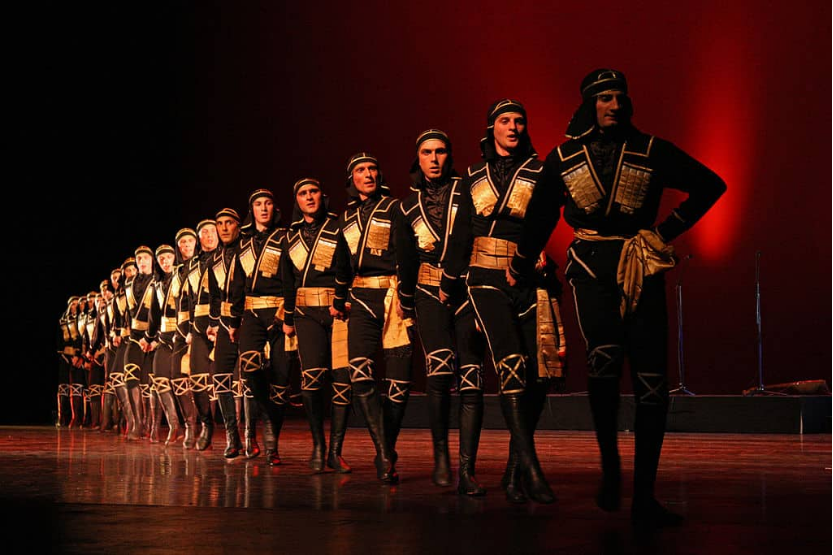
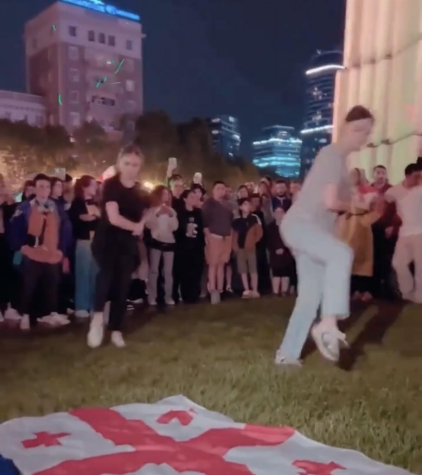
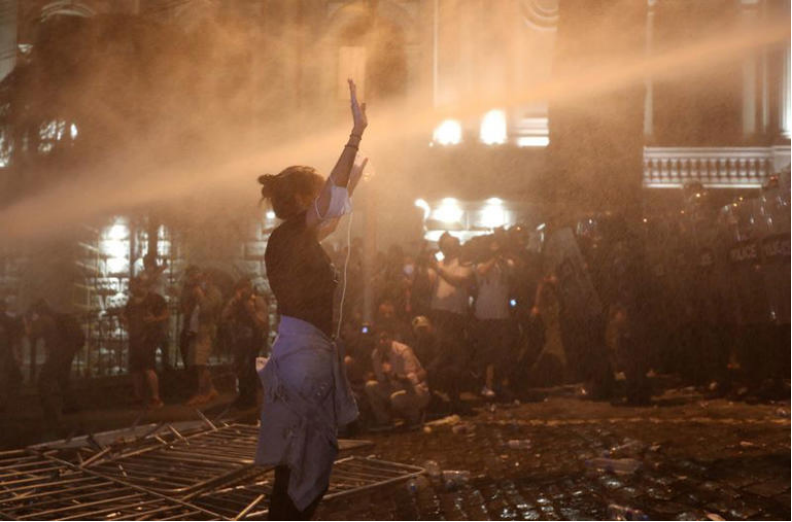
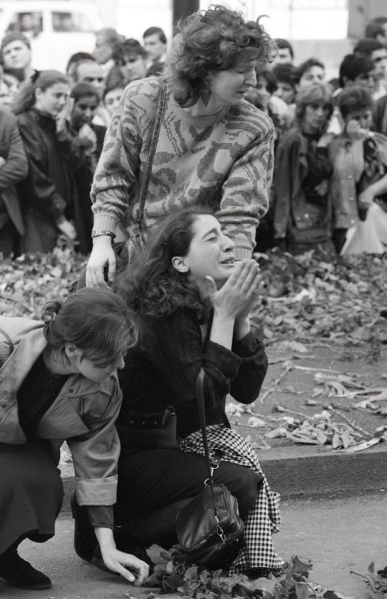
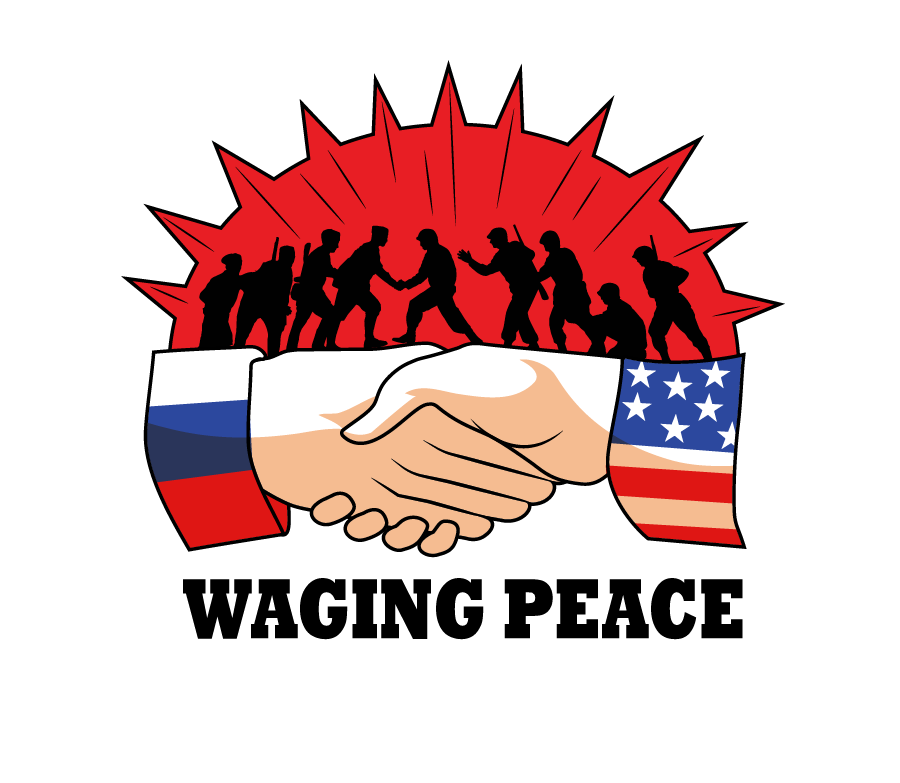
Killer piece. Excellently written and incisive, as usual. If only every Georgian could and would read it. The metal cage being constructed over nearly every democracy today while social media and social-politicians fuel fights over bits of cheese as a diversion is fast blocking out the rays of the sun. We seem to be entering a time of darkness.
I hope people in Georgia read this. What have NATO, the USA and the EU done for Ukraine. Is that really what they want for Georgia?